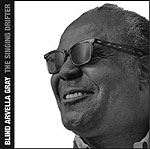
|
|||
|
|||
| Home |
| Gallery |
| Culture/ Technology |
| Fiction |
| Music |
| Poetry |
| Theater |
| What's New |
| About/Contact |
| Archive |
|
Reissing a classic Reviewed November 2005
In his raw, sometimes barely-in-tune (and sometimes out) performances on this recording, the late Blind Arvella Gray can be heard as the predecessor of the so-called juke-joint blues of the Mississippi Delta that enjoyed a surge in popularitiy in the 1990s. Fans of John Weston, Junior Kimbrough, R.L. Burnside or CeDell Davis will recognize the simple chords and bare accompaniment laid down behind a plain vocal delivery – which nevertheless creates a very vivid atmosphere. But Gray, who died in 1980, was of an earlier generation, closer to Robert Jr. Lockwood or Lightnin' Hopkins in the chronology of the blues than to the latter-day artists who ply the juke-joint circuit of the modern Delta. And so perhaps Gray's proper place is as a bridge between the first generation of blues musicians and the above generation of juke joint artists. Gray only recorded one album, in 1972, for the small Birch label, and it has been out of print since then (although he also recorded a handful of singles in the 1960s). Longtime music industry publicist Cary Baker, who as a teenager convinced Birch Records owner David Wylie to issue the original LP, has now founded his own label, Conjuroo, specifically to release this set on CD (although Baker promises more treats should he not lose his shirt on this). If not well-known (due no doubt to the paucity of his recorded output), Gray was one of the most colorful figures in the history of the blues (the reasons for which are laid out in the informative liner notes) and for many years was a regular presence in Chicago, undoubtedly influencing dozens of blues artists who followed him. As this recording shows, his was a melding of the rural blues he grew up with in Texas in the early part of the last century, and the more modern sounds of his adopted Chicago. His singing style was based on a rough, sometimes almost-spoken delivery, not so different from Lightnin' Hopkins'. His guitar is much rougher than Hopkins' nimble style, though. Included on this CD reissue are five more tracks from the same sessions that produced the original album. Review by Jim Trageser. Jim is a writer and editor living in Escondido, Calif., and was a contributor to the "Grove Press Guide to Blues on CD" (1993) and "The Routledge Encyclopedia of the Blues" (2005). |
Copyright © Turbula.net

